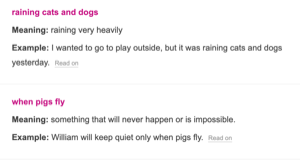 Write A Joke
Write A Joke
Your aim is to produce as many as you can, in the hope that you surprise yourself. Don't worry if they're funny right now, you can improve them later.
Inspiration
In the article below Tim Vine revealed that he often works backwards, writing from punchline to set-up.
“I hear punchlines in everyday conversation and think, ‘How could we get there in a different way?'
If someone says, ‘Serves him right,’ I’ll think, ‘Right, OK… A friend of mine’s got a left arm missing. Serves him right.'"
The delightful @KidsWriteJokes shares childrens' jokes and you can see how they are beginning to understand the format of a joke, but mostly not quite understand how jokes work.
Tims' ear is finely tuned to almost every sentence he hears, on the lookout for different routes or ways to get to them.

How Do Comedians Write Jokes?
https://20bedfordway.com/news/how-do-comedians-write-jokes/Great article with brief guidance from famous comedians.
Resources
See if you can use Tim's "working backwards" technique, starting using an idiom from the site below.

List of Idioms
https://www.theidioms.com/Wonderful collection of sayings and idioms that you might use for inspiration.
Tools
Do any of these tools below tickle your creative funny bone?
How about trying these prompts and see if you can craft a joke from a prompt.
Using a thesaurus to expand a word's possibilities is useful trick to throw into mix too. So too can Googling for lists, and Wikipedia has lots of lists you might use to expand an idea and find that inspiration.
As is often the case with all kinds of creativity, you need something to "get you going", almost anything. In this Joke Writing Masterclass, Peter Collins uses Wikipedia's Random Article feature as inspiration. You may not learn too many tips from this, but it is funny, and you can see how he uses all the tips we've mentioned above.
Once you have created a few, possibly terrible jokes, why not let Artificial Intelligence help you by entering them into Talk To Transformer and seeing where it takes you. I tried and it made suggestions that although weren't funny, did help with making the joke funnier.
RandomWordGenerator
https://randomwordgenerator.com/Generate random words to use as a creative prompts
Talk To Transformer
https://talktotransformer.com/See how a modern neural network completes your text. Type a custom snippet and see what is generated
